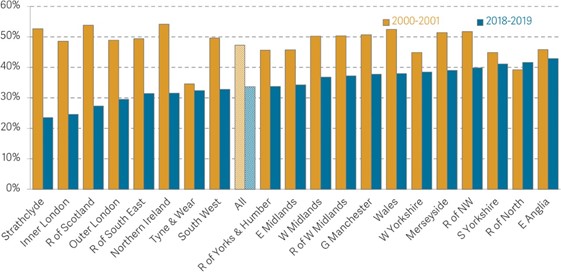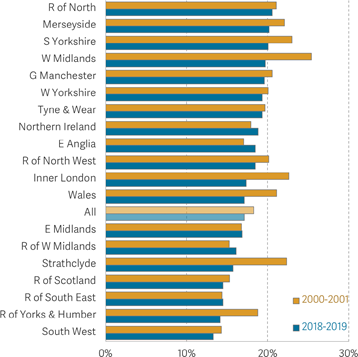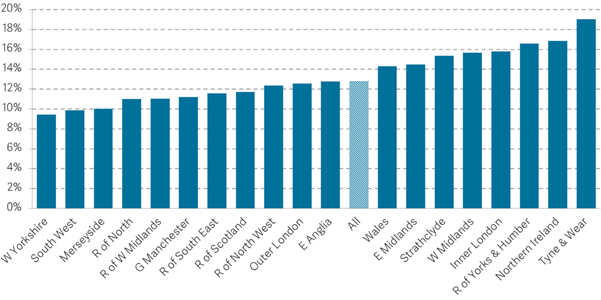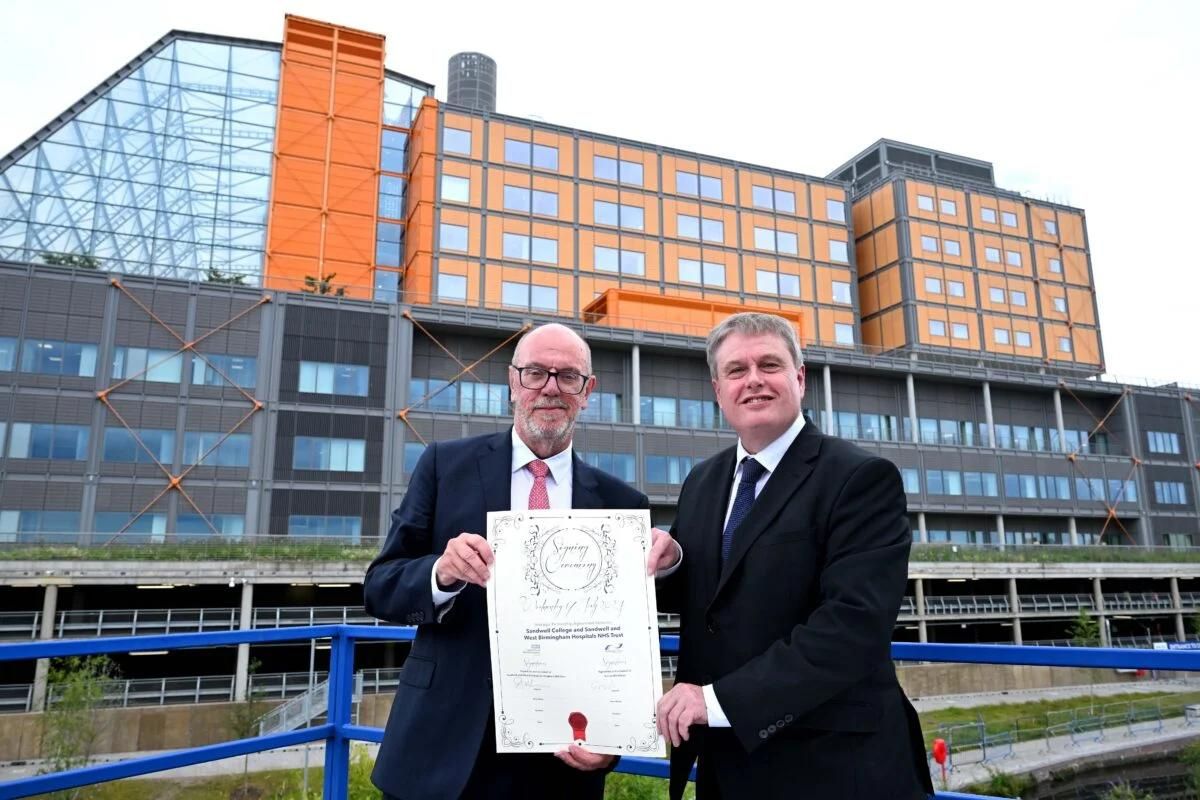Levelling Up and 18-24 Year Olds in England

The long-awaited Levelling Up white paper was finally released a couple of weeks back. And although the white paper included some very welcome proposals on education, skills and employment, we set out here some top-line challenges and recommendations for the policy makers charged with levelling up 18-24 year-olds in England.
Educational Attainment Rates of 18-24 Year-Olds by Region
As many have pointed out before, educational attainment rates vary widely across the country, and – despite large improvements in attainment among young people over recent decades, differences among young people, across the UK are still considerable.
For example, Figure 1 shows that during 2018-2019, the share of 18-24-year-olds with lower-level qualifications – Level 2 and below – in East Anglia (43%) was nearly twice as large as the share in Strathclyde (23%).
It also shows that attainment rates have not only differed between regions in recent years, but also that improvements in attainment rates have differed by region too.
For example, the share of young people in Inner London with lower-level qualifications nearly halved between 2000-2001 (49%) and 2018-2019 (25%) whereas the share in some northern parts of England rose slightly, from 39 to 42%.
The differences, and different rates of improvement, set out above will be driven by a range of factors: from improvement changes in local schools and colleges, to different patterns of migration across the UK and different job opportunities (and thus people) spread about the country. But to get things right, policy makers should know what works – and what policies have worked better than others – in improving young people’s educational attainment across the country.
Figure 1: Proportion of 18-24-year-olds whose highest qualification is GCSE-equivalent or below: UK, 2018- 2019

Unemployed and Inactive 18-24 Year-Olds not in Full-Time Study by Region
But it’s not all about study: if the pandemic has taught us anything it’s that young people are often at the sharp end of the stick when the labour market turns sour.
And it is those 18-24 year-olds not in full-time education who have it hardest – both in terms of the mental health risks of being out of work, but also because they have a higher risk of employment scarring over the longer-term.
It’s worrying therefore, that Figure 2 shows that in some parts of the country in 2018-2019 more than one-in-five 18-24 year-olds outside of full-time education were also out of work.
The worst-hit areas aren’t necessarily the ones you’d expect: for example, outer London topped the list in 2018-2019, with 21 per cent of non-full-time student 18-24s being either unemployed or economically inactive.
Moreover, some regions have actually moved backwards over time, with worklessness among non-full-time students rising and being higher in 2018-2019 than it was in 2000- 2001 across a number of regions, including: outer London, Northern Ireland, East Anglia, the West Midland and – to a small degree – the South East.
Figure 2: Proportion of 18-24-year-old who are not working and not in full-time education: UK, 2018-2019

Helping 18-24 Year-Olds not in Full-Time Study to Find Jobs
The Levelling Up white paper thankfully included a number of initiatives to help people move into – and progress – in work. For example, in Pathfinder areas, they will bring together a number of public service providers, alongside employers and education providers.
But to get things right for young people, it needs to ensure that service providers working with young people understand the particular challenges they face when embarking into the labour market for the first time – knowing where and how to find a job is often the most difficult part. And they would also do well to remember that young people in relatively well-off areas are left out of the new, welcome initiatives set out in the paper.
Helping 18-24 Year-Olds not in Full-Time Study to Find ‘High Quality’ Jobs
And finally, it’s not all about moving into work: the quality of work matters too. And here again, outcomes for young people vary across the country.
For example, Figure 3 shows that the proportion of young people who are outside of full- time education and working on an insecure contract, ranges widely: from just under 10% in West Yorkshire, to 12% overall, to as many as 19% in Tyne and Wear.
Figure 3: Proportion of 18-24-year-olds who are outside of full-time education and on an insecure contract: UK, 2018-2019

Again, those in the richest labour markets don’t always fare best: for example, the share of young non-students in inner London that weren’t on an atypical contract (16%) is considerably above the national average.
In other words, job quality for young people varies – and this matters, given research showing that atypical work (for non-students and non-retirees) is often associated with poor mental health, earnings volatility and lower wages.
Making sure that good, quality employment is available for people – including young people across the country is vital. And that means working with local authorities and employers across the country to set an agenda for ‘good work’ that helps people thrive and progress now, and into the future.
Recommendation 1
Those in charge of Levelling Up should examine what worked – and didn’t work – well in the past when it comes to boosting the human capital of 18-24 year-olds.
Recommendation 2
Employment support programmes should include initiatives that target 18-24 year-olds not in full-time study and recognise that a large share of young people face employment barriers even in London.
Recommendation 3
Levelling up requires a clear focus on job quality, encouraging employers to offer better pay – and conditions – especially to 18-24 year-olds not in full-time education.
Kathleen Henehan, Senior Policy and Research Analyst, Resolution Foundation
Post-16 Education and Skills: Levelling Up Everyone, Everywhere
Campaign for Learning’s paper Post-16 Education and Skills: Levelling Up Everyone, Everywhere, is a collection of 18 articles and recommendations by leading stakeholders and thinkers across the post-16 education and skills sector.
The paper covers six key considerations for the Levelling Up agenda – national and place based strategies, young people, lifelong training, lifelong learning and post-16 providers.
As the articles show, from the perspective of post-16 education and skills policy, levelling up is about people as well as places – the policy canvas is vast, the perspectives diverse and the insights important.
Together, our authors demonstrate the need for strong, nationally based as well as place based strategies if everyone, everywhere aged 16 and over are to level up through education and skills’
Part 1: Levelling Up and National and Place
- Andy Westwood, Professor of Government Practice, University of Manchester - Levelling Up and the Department for Education
- Sam Freedman, Research Fellow, Institute for Government – Levelling Up and Post-16 Education and Skills
- Fiona Aldridge, Head of Skills Insight, West Midlands Combined Authority – Levelling Up the West Midlands by 2030
- Mark Hilton, Policy Director, London First – Levelling Up London by 2030
Part 2: Levelling Up and Young People
- Geoff Barton, General Secretary, ASCL - Levelling Up and Education: Lots of Stuff but Little Substance
- Sam Tuckett, Senior Researcher, Education Policy Institute – Levelling Up 16-19 Education
- Becci Newton, Director of Public Policy and Research, IES – Levelling Up Participation by 16-18 Year Olds
- Kathleen Henehan, Senior Policy and Research Analyst, Resolution Foundation – Levelling Up 18-24 Year Olds in England
Part 3: Levelling Up and Lifelong Training
- Olly Newton, Executive Director, The Edge Foundation - Placing Vocational Education at the Heart of Levelling Up
- Mandy Crawford-Lee, Chief Executive, UVAC – Higher Technical Education, Higher & Degree Apprenticeships and Levelling Up
- Ewart Keep, Emeritus Professor, University of Oxford – The Role of Employer Training in Levelling Up
Part 4: Levelling Up and Lifelong Learning
- Stephen Evans, Chief Executive, L&W – Levelling Up in England through Lifelong Learning
- Susan Pember, Policy Director, HOLEX – Levelling Up as a Nation of Lifelong Learning
- Simon Parkinson, Chief Executive, WEA – The Future of Adult Learning is in the Hands of Local Leaders
Part 5: Levelling Up and Post-16 Providers
- David Hughes, Chief Executive, Association of Colleges – Well-Funded Colleges to Serve Every Community
- Nick Hillman, Director, HEPI – A ‘Higher Education Institute’ in Every Community
- Chris Hale, Director of Policy, Universities UK – Levelling Up and Widening Participation into Higher Education
- Jane Hickie, Chief Executive, AELP – Levelling Up is as much about People as Places











Responses